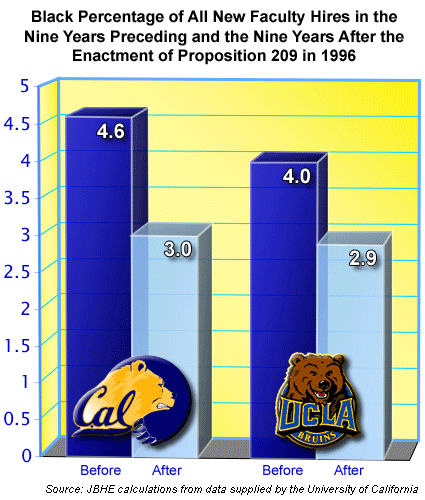



Proposition 209 Has Had a Devastating Effect on Black Faculty Hiring at the University of California
In November 1996, voters in California approved a public referendum that banned the use of race in admissions decisions at state-operated universities in California. The impact has been devastating on black enrollments.
But Proposition 209 not only bans race-sensitive student admissions at the University of California, it also prohibits the use of race as a factor in hiring decisions for faculty positions. From 1984 to 2005, there have been 9,021 appointments to faculty positions at all of the University of California’s campuses. Of these, 275, or 3 percent, have been black.
But when we break these figures down to cover the periods before and after the enactment of Proposition 209, we find that in the nine years immediately prior to the referendum there was a total of 3,975 faculty appointments systemwide. Of these, 136, or 3.4 percent, were black. But in the nine years since Proposition 209 has been state law, the 120 new black faculty members made up just 2.9 percent of the more than 4,000 new appointments.
The impact of Proposition 209 is even greater at the two most prestigious campuses of the University of California system. From 1987 to 1996, there were 27 new black faculty appointments at Berkeley. They made up 4.6 percent of the 593 new appointments made in that period. In the nine years since Proposition 209, there have been 18 new black faculty appointments. They made up 3 percent of the 599 new faculty hires.
At UCLA, 31 blacks were hired to faculty positions in the 1987 to 1996 period. They made up 4 percent of the 770 new faculty appointments. In the nine years since Proposition 209 was enacted, there have been 18 new black faculty members hired at UCLA. They made up 2.9 percent of the 625 new hires during the nine-year post-Proposition 209 era.

![]()
Copyright © 2006. The Journal of Blacks in Higher Education. All rights reserved.